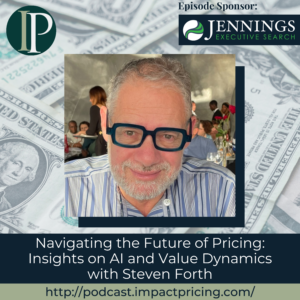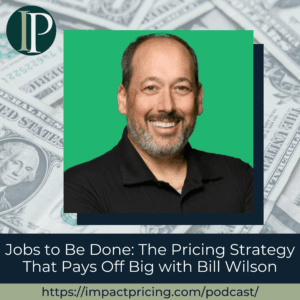Steven Forth is Ibbaka’s Co-Founder, CEO, and Partner. Ibbaka is a strategic pricing advisory firm. He was CEO of LeveragePoint Innovations Inc., a SaaS business.
In this episode Steven shares the shifting landscape for pricing professionals, emphasizing the rising importance of pricing strategists over analysts in leveraging AI for value-centric decision-making. Additionally, he highlights the possibilities beyond automation to include real-time recalibration of value models, enabling companies to better adapt to changing customer needs and market dynamics.
Podcast: Play in new window | Download
Why you have to check out today’s podcast:
- Discover the importance of custom packaging solutions designed to meet the unique needs of diverse users, adding significant value to their experience and allowing for optimized pricing strategies
- Find out how AI is impacting pricing strategies
- Understand the evolving role of pricing people: pricing analysts and pricing strategists
“What pricing people should be doing today is learning how to have productive conversations with AI agents.”
– Steven Forth
Topics Covered:
02:44 – Discussing about platform pricing and solution pricing in the context of AI
05:40 – The challenge that pricing platforms presents when it comes to quantifying value for all users
07:06 – Generative AI versus computational knowledge AI in the case of Wolfram Alpha
10:20 – Highlighting the value of packaging solutions tailored to specific needs which can be more valuable to users
12:06 – What goes in the pricing world with AI around
18:38 – Pricing strategists becoming increasingly important, need for better systems to facilitate meaningful conversations and decision-making
20:11 – Would it be possible for AI to make people inside the company understand what value is to customers
24:08 – Six types of value drivers according to Ed Arnold
27:03 – The challenge of building large amount of value models
30:20 – Steven’s best advice to pricing people
31:12 – Building a value model through client interviews
Key Takeaways:
“Why don’t people focus more on value? I think part of this is because many of us find it easier to look inside our own company than outside to our customers.” – Steven Forth
“In an uncertain world, having options and being able to generate options gives you a much more adaptive and resilient business.” – Steven Forth
“They [pricing people] need to be learning how to ask the AI questions. They need to be learning how to train the AI so that it can better answer those questions.” – Steven Forth
“They [pricing people] need to be understanding the strengths and weaknesses of the answers they’re going to get. Because like it or not, you are going to be using an AI, you are using an AI, in your work today, even if you’re not aware of it.” – Steven Forth
People/Resources Mentioned:
- Wolfram Alpha: https://www.wolframalpha.com
- Stephen Wolfram: https://www.stephenwolfram.com
- Mathematica: https://www.wolfram.com/mathematica/
- Pros: https://pros.com
- Zilliant: https://zilliant.com
- Ed Arnold: https://www.linkedin.com/pulse/how-quantify-value-service-ed-arnold/
- McKinsey: https://www.mckinsey.com
- Microsoft Co-Pilot: https://copilot.microsoft.com
Connect with Steven Forth:
- LinkedIn: https://www.linkedin.com/in/stevenforth/
- Email: [email protected]
Connect with Mark Stiving:
- LinkedIn: https://www.linkedin.com/in/stiving/
- Email: [email protected]
Full Interview Transcript
(Note: This transcript was created with an AI transcription service. Please forgive any transcription or grammatical errors. We probably sounded better in real life.)
Steven Forth
What pricing people should be doing today is learning how to have productive conversations with AI agents.
[Intro]
Mark Stiving
Today’s podcast is sponsored by Jennings Executive Search. I had a great conversation with John Jennings about the skills needed in different pricing roles. He and I think a lot alike. If you’re looking for a new pricing role, or if you’re trying to hire just the right pricing person, I strongly suggest you reach out to Jennings Executive Search. They specialize in placing pricing people. Say that three times fast.
Mark Stiving
Welcome to Impact Pricing, the podcast where we discuss pricing, value, and the changing relationship between them. I’m Mark Stiving, and our guest once again today is Steven Forth. And here are three things you want to know about Steven before we start. He is the founder and CEO of Ibbaka. He is a frequent guest of our podcast, and in his youth, he was a high level sailor. It’s actually just hard to picture Steven and his youth. Welcome, Steven. So almost every time we get together, lately, we’ve been talking about AI. And so I have to give you my AI experiences at this point, my thoughts on AI. And I guess before I do that, a lesson that I’ve learned not too long ago was the difference between platforms and solutions. So Zoom is a platform, and as a platform you can do many, many different things with it, solve many, many different problems and it turns out that you could solve a specific solution.
So they do telemedicine, right? And so there’s a specific solution. They charge more for the specific solution than for the platform. Which I find fascinating, right? And so now when I think about the world of AI, and I think of chatGPT and what I hate about it is, it’s a platform. I can do anything, which means I have no idea what to do. And so I’ve been getting these emails and it gives me, every day I get five lists of here are five new AIs of things you can go do, and these are solutions. So it’s like, there’s reality behind it. Now, I haven’t adopted any of those yet, but I’m always watching, it’s like, okay, is that a problem I want to solve? Is that a problem I want to solve? And so it’s really reframing my way of thinking about AI. So I’m just going to pause for a second and let you pontificate on what I just said.
Steven Forth
So I think this is a sort of standard thing that we need to think about in pricing, right? So one of the most common packaging patterns these days is a platform with extensions. And there’s always a tension as to how much you charge for the platform, if you charge for the platform, and how much you charge for the extensions. And packaging and pricing go hand in hand. I mean, you can’t price unless you have a packaging architecture. but the pricing influences how you think about the packaging architecture. So, these two things go closely together. And it’s a really interesting question, right? Let’s just say that you have a solution. In a certain case, say it’s creating a thousand dollars of value. You want to claim a hundred dollars of that. So you’ve got a hundred dollars to play with. So how much of that should you put into the platform pricing, and how much of that should you put into the solution pricing?
And so that sounds like a fairly simple problem. but then you have to look at how it scales. So, let’s say it then scales from a thousand dollars in value to $10,000 in value. It’s very difficult to design a pricing model that keeps the platform and the solution balanced across multiple levels of scale, especially if you have lots of different extensions or modules. So, I think you’ve put your finger on one of the key challenges in pricing today, which is the value of the platform versus the value of the solution. And how to balance them. And what we’re seeing in AI is some interesting things, right? For some people, AI is an extension on top of their existing platform. And for other people, they have inverted it so that AI has become the platform and their existing platform is a solution on top of their AI platform. So, really fun time to be working in this area because there are so many things at play and so many options to explore and to think about.
Mark Stiving
So, believe it or not, after I had this realization, or probably the reason I had this realization was I was working with several customers who sell platforms. And it is so hard to put value on a platform because there’s some people who get no value, right? Having a conversation with your family, there’s no real dollar value there. But closing a million dollar deal, there’s a lot of dollar value there, right? And so it’s hard for Zoom to say, I’m going to price for the million dollar deal and ignore the person who wants to talk to their family. And it’s hard to price for the person who wants to talk to their family and then charge for the million dollar deal. So, selling a platform, we end up driving to, forgive me for saying these words. We end up driving to a cost-plus pricing because competition’s driving everything down as much as they possibly can because we all want the platform business.
Steven Forth
Yeah, I mean, that’s an interesting point. And I think that there are cases, and I’m thinking about some of the companies that Ibbaka works with, where the platform price is designed to set a floor. and that floor is designed to protect the cost structure of the business, and then the bulk of the revenue and the margins are realized on the extensions. but there are other cases that’s quite often the case. But I also have seen cases where you want to really monetize the platform and the extensions to the platform you’re using to drive traffic and drive business to the platform, and you’re not particularly trying to monetize them. So I don’t think there’s one general rule that we can set out here. it depends a lot on the business model and the strategy that you’re executing on.
Mark Stiving
Alright. So I gave you that whole intro because what we’re going to talk about today, it felt like that was relevant . And so what we want to talk about today is what do we think is going on as our pricing experts and what’s changing in their world? And I perceive AI, of course, right? I mean, we can’t have this conversation without talking about AI, but is it AI as a platform or is it specific solutions that they can adopt and say, hey, I’m going to pick that solution up and try to apply that in my company.
Steven Forth
I think all of us need to become generally conversant with the different types of AI and how they work. Whether it is generative AI, which is the really popular topic for the last year or if it is more around deep learning systems more generally or there’s a rule for symbolic reasoning. Yeah. And Wolfram and Wolfram Alpha have a tremendously powerful application around symbolic reasoning that is really relevant to people in pricing. So I think we need to, as pricing experts, we need to have a general understanding of AI at a fairly sophisticated level.
Mark Stiving
Okay, so teach us, and I’ve never even heard of this third one, so go especially start there.
Steven Forth
Oh, you haven’t used Wolfram Alpha?
Mark Stiving
I have not.
Steven Forth
Ah, your life is going to be so much fun for the rest of the day. so go to Wolfram Alpha. It is spelled…
Mark Stiving
Spell that.
Steven Forth
Wolfram, W-O-L-F-R-A-M, and then Alpha as in Alpha Bravo. so Wolfram Alpha is a computational knowledge platform. So, for example, a search engine if you ask it, how far is it from Chicago to Los Angeles will, search through all of the things that it’s indexed and find a number of answers based on search. Generative AI will go through all of the data that it’s collected and processed to create its probability model and find the most probable answer to that question. What a computational knowledge model like Wolfram Alpha does is that it knows where Los Angeles is, and it knows where Chicago is, and it knows the curvature of the earth, and it calculates the answer.
So it’s a fundamentally different way of solving the problem. And Stephen Wolfram is the guy who created the software Mathematica and Wolfram is the underlying language that has been developed over the last 30 years to do this kind of computational knowledge and reasoning. and then Wolfram Alpha is a public website that you can use to ask questions, usually questions where you would want to compute the answer. but there’s lots of things where a computed answer is really interesting, right? Lots of things about music, lots of things about aerodynamics and flying. Lots of things about pricing where a computed answer is going to be more useful than a searched for answer or one that is sort of based on the probability, the weighted probability of billions of pieces of data.
Mark Stiving
So, okay, I remember using Mathematica and thought it was amazing. Of course, it never did the really complicated equations that I needed in my doctoral program, but it was still amazing. It was fun to use and incredible to see. As a pricing person, I would need to be able to upload my purchase data or whatever data I happen to have in order for them to use my data to make these calculations. Is that feasible?
Steven Forth
Yeah. Well, and I think there are probably simpler ways to do it in most cases. So, let’s go back to the question of how the world is changing for pricing people. but I do encourage you to go and play with Wolfram Alpha. and if you really get into it, there’s a lot of resources about the Wolfram language itself available online that you can find. And Stephen Wolfram has written some of the best critiques or comments on how generative AIs work. So it’s nice.
Mark Stiving
So, one quick comment. I’m actually looking at their homepage right now. And there’s no doubt this is a platform. It can do so many different things and solve so many different problems. And I could imagine somebody taking this capability, packaging it up like Pros or Zilliant or one of these pricing companies and saying, hey, we’ve now applied this in the pricing world. These are the problems we solve, and now we’re selling solutions, not a platform. And now it feels really relevant to a pricing person.
Steven Forth
Yeah. And I would add, far more valuable. So that’s an example of a case where the platform on its own because it doesn’t solve my problem, the value is limited. And I think, I’m not sure about this, but I suspect that Mathematica and Wolfram have struggled to really monetize Wolfram Alpha for the reason that you just identified. It does too many things. and it’s easier to monetize something that does a very specific thing.
Mark Stiving
Yep. Okay. So talk about the world of pricing people going forward.
Steven Forth
Let’s think about the things that we do day to day. So I’m just going to take a typical process that that Ibbaka does when we start working with a customer. So one of the things we do is we do a lot of data analysis which involves getting data from the customer, cleaning it up, and then running it through a set of analytical tools. And in our case, we build our own tools. So there’s three things that happen here, right? One is getting data, the second is cleaning data. And then the third is actually, I guess the fourth thing. Third is building the analytical tools. And then fourth is doing the analysis. And then none of which has really created a lot of value yet, because you have to get from the analysis to some insights and recommendations. So getting data will continue to be difficult, problematic, patchy, and the data will continue to be sparse, inconsistent and contradictory. And that’s just the world that we live in. The cleaning of the data within the next, I’m going to say 12 to 18 months, will be almost entirely done by AIs, including generating synthetic data that sort of helps to fill some of the holes so that that large piece of work is going to be automated and will disappear.
Mark Stiving
Steven, can you just say a few more words about that? I have to say, that had to be my least favorite part of doing any data project. And there was so much thought involved as in, hey, if I throw away this data point, am I skewing my results? And so how is it that AI is going to do that for us?
Steven Forth
So first that’s great that you worried about that, but the fact that you could get to a point where you could worry about that meant that already a lot of work had been done to organize and clean the data. So to even start worrying about what to keep and what to throw away meant that you’d understood the data well enough to ask those questions in a meaningful way. So, the AIs are going to be given a data set and possibly a couple of frameworks and say, map this data to this framework. And then you’re going to say, okay, so there’s a lot of holes because there’s almost always a lot of holes in pricing data to infer values to fill up the holes. So they’ll generate synthetic data, and that will give us a much richer data set. Now, you’re probably worrying, will that synthetic data skew the model? and the answer is probably yes, but the lack of the synthetic data also skews the model. So it’s not like you can escape from the model getting skewed. You just have to have ways of managing it and thinking about what skew is being introduced by each approach. And again, the AI will help you think through those problems. And what I hope happens is that having these AI-based tools that take care of a lot of the routine work allow us to do more exploration. And what you said, do I keep this data point or throw it away? Well, let’s check both things and see what happens and see which one I can connect to meaningful action.
Mark Stiving
So, okay. Got it.
Steven Forth
Yeah. And increasingly the tools will be built with the help of AI. So one of the quasi successful uses of generative AI has been encoding and generating code and in composing things. So, at Ibbaka we use a language called Julia for data analysis. and within the next 12 months, I expect that a lot of the Julia coding will be done with the help of an AI. So I’ve got the data. I have cleaned it and organized and filled it. I’ve built tools. then running those tools against the data, again, that’s something an, that an AI can be set up to do. The next question though becomes, what are the insights from that data? So there, I think, it becomes a conversation between the pricing analyst and the AI where they jointly interrogate and ask questions about the data and do this exploration. Exploration, I think, is going to become more and more important, as we have better and better tools to let us explore different scenarios and situations.
Mark Stiving
I was going to say, I could see how that would be really convenient. Instead of me trying to run new models every time I wanted to know a result, I would say to my AI, what happens if I just look at this market segment? Or what happens if I want to lower the price on this segment and raise the price on that segment? And that’s so much easier.
Steven Forth
Yeah. And you’ll do it more, right? I can remember. So when, Ibbaka first developed a set of clustering tools. So we don’t sell this, but we use it internally. We have an application called geode now that we use for doing data clustering. And it applies a number of different algorithms, like k-means and leiden and fuzzy, and allows you to change the parameters so that you can look for clusters in different ways. And what one of our pricing analysts said when she started using this, she says, oh, I thought this was going to save me time. But it doesn’t really save me time. It lets me explore the data in new ways and ask more interesting questions. So she’s spending just as much time, she’s actually spending more time on the clustering and looking at the clusters, figuring out what’s driving the clusters.
Is this a clustering that’s useful in pricing segmentation, or is this a cluster that’s based on some sort of set of variables that we can’t use for pricing, it lets her explore better. Yeah. And I think that was the case with geode and all these clustering algorithms we work with. But it’s going to become more and more the general case as we get used to working with AIs. So, the skillset is going to shift from the ability to clean data and write Julia code and do analysis to asking questions of the data that lead you to sort of meaningful insights.
Mark Stiving
So if we could split the world of pricing people into two and one we’ll call pricing analysts and one will call pricing strategists. What I just heard you say is pricing analysts, that role is likely going away and pricing strategists become more and more important because you actually have to think about the data and the results.
Steven Forth
I think that’s absolutely true. I think that’s the direction that we are going and we need to build better systems that are better able to have conversations with pricing strategists. I don’t think, no time in the next 10 years are you going to give your pricing strategy to an AI to figure out. I don’t see that happening in the next decade. and since I’ll probably be retired after a decade, I’m not going to worry about it . So I think that I’m okay for the next 10 years or so, which is all I really plan on working.
Mark Stiving
Okay. So I’m going to slightly change the topic, if you don’t mind. something you know really well, by the way. I said these words to someone who works with me today, and it surprised me I said these words and I said I don’t really care about pricing. I really care about value. And I don’t think many people focus on value at all inside a company. So how is it that AI is going to help us get to some nirvana where everybody in the company can actually understand what value means to our customers?
Steven Forth
That’s a great question. I’m not sure that I have a good answer, though. Let’s think about that. So one of the challenges with value, is, it’s so context dependent and it changes much more quickly than we would like to think. And it changes for different reasons. one is that, what is differentiating today is the commodity tomorrow. So there’s a constant movement of differentiation into commodity,
Mark Stiving
Especially in tech.
Steven Forth
Yeah. Especially in tech, which is the world that I mostly live in. The second challenge is that value can be very, very dependent on both the customer’s current situation. And it’s the customer’s current situation. So, I’m doing some work right now on churn and how to better manage churn. And I think the first question you need to ask when you’re looking at churn is how are your customers’ businesses doing? So if your customers are seeing their business diminish, you should expect some of them to churn, and you should expect the revenue that you can extract from them to come under pressure. If on the other hand, your customer’s business is flourishing then you’ll probably have less churn. Your customers are not one set, right?
You have some customers that are getting into trouble, some customers that are flourishing, some customers that are changing their business models. There’s just an enormous diversity. And one of the things that AI will let us do is better manage that sort of diversity and complexity. Because if I were to tell you, chief revenue officer at a hundred million dollar SaaS company that you’re going to have to recalibrate your value model for every customer every week they would say, yeah, okay, go, I’ve got something more useful I need to be doing. But if you have an AI, you say, and I’ve developed an AI that recalibrates the value model for every customer every hour, so that you can understand where you’re creating value and where maybe your value is declining, that actually becomes pretty exciting.
Mark Stiving
Okay. So I would agree that’s exciting. I have no clue how it’s possible.
Steven Forth
I think that the tremendously interesting challenge that people in pricing have over the next five years is to make that possible. But just to come back to your question, why don’t people focus more on value? I think part of this is because many of us find it easier to look inside our own company than outside to our customers. And you can’t really talk about value by looking inside your company. You can only talk about value by looking outside, looking at your customers and what your customers are doing for their customers. So you almost have to take two steps out.
Mark Stiving
Yep.
Steven Forth
And that’s I think why it’s hard for many companies to focus on value because they’re focused…One of the things that we’ve talked about in the past is usage-based pricing, but usage does not equate to value. I could design a really bad application that forces you to take lots of steps and work really hard to get any value out of it. And that usage is not associated with value, or I could have something that is from the user experience really simple and elegant, and it only takes two actions in order to complete a task that has value. We’re straying a bit from the theme, but…
Mark Stiving
No, I’m with you. And by the way, I recently have started saying B2B value is always measured in incremental profit.
Steven Forth
The incremental profit you can give to your customer, right?
Mark Stiving
Exactly.
Steven Forth
Yeah, exactly.
Steven Forth
I think that is largely true. but there are a couple of other things that are worth thinking about. So, at Ibbaka, and this is based on work that Ed Arnold has done over the last couple of decades we classify value drivers into six types. So there are revenue value drivers, operating cost value drivers, operating capital reduction value drivers, and nobody cared about operating capital until interest rates started to go up again. there’s capital investment value drivers, but then there’s risk reduction value drivers, and there’s option creation value drivers.
Mark Stiving
What’s the last one?
Steven Forth
So the last one, option creation is, and these ones are tough. I agree, but option creation is by using my solution, you will have more different options that you can pursue in the market. Now, you can say, and I expect Ed Arnold will say that, who cares? We only care about those options. If those options connect back to more revenue or to risk reduction or whatever the option creation is only relevant when it can be connected to some other business goal. Fair enough. But in an uncertain world, having options and being able to generate options gives you a much more adaptive and resilient business.
Mark Stiving
I’ll buy that. Let’s call it the opposite of risk.
Steven Forth
Yeah.
Mark Stiving
And so it’s a statistical thing.
Steven Forth
Yeah. And then there’s another case. Again, I don’t deal with these companies very much, but there’s another class of company where the balance sheet is incredibly important to the value of the company. So a couple of Ibbaka’s customers create software or technology for the mining sector, and one of them allows you to look deep into the structure of an ore body and get a much better understanding of that ore body. Part of the value of that is then it increases the reserves on the mines books. So that’s not necessarily directly going to be revenue, but it can have a huge impact on the company’s value. And I guess you can argue that that’s actually revenue. It’s just future revenue.
Mark Stiving
Exactly, that’s what I would argue is it’s future revenue. So, I would take Ed’s six, and in fact I do, I say that there’s three, there’s only three places where you’re going to get increased profit, and that’s revenue growth, cost cutting, and risk reduction. Right? And I think each of Ed’s, although they’re more refined than what I just said I think I could fit them into one of those three categories. But absolutely, I think that’s the key point, is where is that value? And can we articulate how our customers are getting value from our product?
Steven Forth
Yep. And so that’s, again, so if I look at the second thing that Ibbaka does after it does this data analysis is we build a value model. So my question for my team is, can we use AI to build value models? So right now we spend a lot of time and intellectual effort to build and validate value models. And I remember someone from one of the large pharma companies said if I were to take a value-based approach, I would need to create over a thousand different value models. I can tell you right now that Ibbaka is not able to do that. McKinsey is not able to do that. I am not able to do that. So I’m stuck. I can only use value-based pricing for the very best products in my portfolio. The rest of it, I would love to use value-based pricing for, but I don’t have the resources to do it. And that’s a fair comment, right? If he’s absolutely right. If you were to come and say, I need a thousand value bottles, well, Ibbaka would have to say, sorry, go talk to someone else, but it’s just not going to be cost-effective. because you don’t know which of those thousand are going to be important.
Mark Stiving
I think of the halt, I think of that as the same problem as a grocery store or a distributor who has a hundred thousand products and obviously they’re doing cost-plus pricing because they don’t know what else to do. Could we move that towards value-based pricing, which is, hey, we take this product category, or we take this brand, or we take this and we change the margin, but in the end, it’s still a cost-plus, manufacturer or supplier raise their price. We’re raising our price right. By this amount.
Steven Forth
So, yeah. So again, if the AI was able to help generate and help you manage having a large number of value models, that changes the game.
Mark Stiving
Yeah. And we do see AI a lot in the consumer products today, and that’s because there’s so much data. They are crunching through that data constantly. where in the B2B space where you and I spend most of our time there’s not as much data.
Steven Forth
Yeah. There’s not as much data and it’s not clear, I think to anyone that generative AI is going to be how we solve this problem. This is why I think Stephen Wolfram’s ideas about how do you combine computational AI and generative AI are going to be really interesting and important. I’m not saying that the only way to do this is with Wolfram or Wolfram Alpha or the Wolfram language. But the idea I think is important is that we’re going to need to learn how to combine different types of AI in one solution. Because think about human intelligence. Human intelligence is not one thing. There’s lots of different dimensions to human intelligence. And if we only had one form of intelligence, we wouldn’t have evolved and we wouldn’t be successful.
Mark Stiving
Okay. Steven, as always, we’re out of time. We talk too much. but do me a favor and try to wrap this up in a brief description. What do you think pricing people should be doing today?
Steven Forth
So what pricing people should be doing today is learning how to have productive conversations with AI agents. They need to be learning how to ask the AI questions. They need to be learning how to train the AI so that it can better answer those questions. They need to be understanding the strengths and weaknesses of the answers they’re going to get. Because like it or not, you are going to be using an AI, you are using an AI in your work today, even if you’re not aware of it. and you’ll be using them more and more as Microsoft Co-pilot and other tools like that infiltrate the workspace.
Mark Stiving
Nice. And, and I do have to admit although I push back against AI, every time I talk to you, I am using it more and more just to have conversations about topics and see what I can learn from them.
Steven Forth
Yeah. So I’m pretty sure that every client interview that we do now. So we do a lot of interviews because part of our process, we build a value model, we generate a value story, and then we validate that value story by having these structured value interviews with customers. Every one of those interviews now gets run through an AI as part of the summarization and analysis process without exception. Every conversation we have ends up getting processed by an AI at some point in the workflow.
Mark Stiving
Nice. Steven, as always, thank you so much for your time today. If anybody wants to contact you, how can they do that?
Steven Forth
The best way is to just send me an email directly, Steven [email protected], or I am very easy to find on LinkedIn and I am active. Some would even say hyperactive on LinkedIn.
Mark Stiving
I appreciate all your comments when you read my stuff. Thank you.
Steven Forth
We’re building a community.
Mark Stiving
Yep. And so finally, if you have any questions or comments about the podcast or pricing in general, feel free to email me, [email protected]. Now, go make an impact!
Mark Stiving
Thanks again to Jennings Executive Search for sponsoring our podcast. If you’re looking to hire someone in pricing, I suggest you contact someone who knows pricing people contact Jennings Executive Search.
















